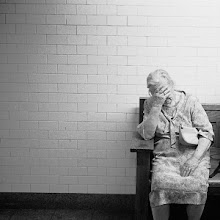Like most boys at the time, one of my favourite playground games when growing up was cops and robbers. Basically, this mainly involved running around making high pitched siren noises if you were a cop and squealing brake noises if you were a robber. Invariably, these games would end in childish debate about whether or not a cop was allowed an invisible gun to shoot back at the robbers, another about whether we were playing British rules or American rules and so on, eventually there’d be a drawing up of some sort of cop/robber game rules and then Mrs Murcott would ring the bell and we’d go back inside to learn the nine times table.
Every playtime was basically the same, a mob of boys running about childishly lashing out at each other with skilfully aimed blows so as not to actually hurt one another. Bad American accents and dodgy car noises aside, we were a perfect simulacrum of the police as we understood it – a non-violent force for good against the tide of crime.
Now, of course, the kids would have to be turning their school badges inside out and striking innocent protestors as they walked by.
The decision by the Director of Public Prosecutions not to prosecute Simon Harwood, the policeman widely acknowledged as behind the assault on Ian Tomlinson moments before the latter’s death, is as depressingly predictable a decision as could have been made. Despite a seemingly strong body of evidence, such as the video footage of the unprovoked assault, the coroner’s own report and an investigation by the Independent Police Complaints Commission, it seems there is little stomach for the political carnage that would inevitably ensue should a trial for manslaughter at the hands of the police arise.
The tragedy of the decision is two-fold. Firstly, it means the Tomlinson family, who have so far acted and responded with a dignity not always seen by those caught up in high-profile police stories, are denied the opportunity to see justice done for their late relative. More importantly, perhaps, it means the rest of us, the people who presume that the police are employed for their protection, are themselves denied the necessary debate about the nature of 21st century policing, about the extent to which the police are involved in helping to stifle legitimate protest about issues of public concern.
Tomlinson’s death came at the end of a day when police tactics were under heavy scrutiny. The G20 protests were overshadowed by debate about the tactic of forcibly detaining large bodies of protestors with the tactic of “kettling” and the relationship between big business, government intelligence and police brutality seemed no longer to be the paranoid preserve of conspiracy theorists.
In 2008, the protest group Fit Watch, a group opposed to police surveillance being used at public protests, found themselves at the sharp end of this relationship. Two women were assaulted and subsequently held without charge for four days for asking policemen present at the Bridgnorth demonstration to display their badge numbers.
Police presence at demonstrations is an obvious necessity. All protests attract an element of trouble-makers, some more so than others. But the police are increasingly employed as a means of stifling such protest in the first place.
It is right that the sentences meted out to those found guilty of seriously injuring or murdering police men and women in this country is severe, those charged with the responsibility of keeping law and order in our streets must do so in the knowledge that the public they serve will stand firm with them in their time of need. But the status of the policeman has a flip side, the badges they wear with such pride must not protect them from the law they are sworn to uphold.
Nominally a member of the party most traditionally associated with civil liberties, our deputy Prime Minister would seem the person best placed to address your protest to. From his offices this week, he may well have observed the peace camp at Parliament Square finally being disbanded. Clegg recently urged the public: "Be demanding of your liberties. Be insistent about your rights." But you'd be well advised to do so in an orderly fashion.
Thursday, 22 July 2010
Subscribe to:
Post Comments (Atom)





No comments:
Post a Comment